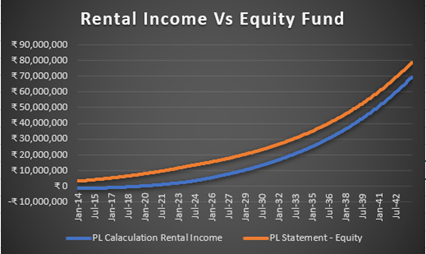Comparing Rental Income: A Deep Dive into Real Estate vs. Other Investment
Let's revisit the example of Ram from the previous chapter. Typically, experts advise against investing in real estate due to comparatively lower returns and higher risks when compared to other investment options like equity or mutual funds. Let's delve into the details.
Ram has an initial capital to either buy
an apartment in Bangalore and rent it out or invest in a fixed deposit. He's in
a dilemma, as there's widespread advice to invest in real estate for a more
stable income. Ram is uncertain about what would be the best investment.
If he decides to buy an apartment and rent it out, he'll incur expenses like a mortgage loan at 8% interest. Considering he falls under the 30% tax slab, there will be deductions on rental income, and maintenance costs will be subtracted from the rental. On the income side, he will receive monthly rent, which can be redirected to other investments, and the apartment may appreciate in market value
Own Contribution:
₹16,15,995
Home Loan: ₹38,67,832
TDS: ₹46,894
Registration Charges:
₹3,61,964
Home Interiors:
₹11,78,583
The total initial cost of the apartment
is ₹70,17,268..
On the other hand, if he opts to put the initial capital into a fixed deposit, the amount designated for home loan repayment needs to be reinvested in the deposit, both calculated at an interest rate of 5.9% per annum. Tax is deducted considering the 30% slab. The graph below illustrates the profit-loss calculation for both options.
If the identical capital is invested in stocks, yielding a return of 13%.
If the capital increases, it implies that your rental yield will decrease significantly. A major risk in real estate lies in liquidating assets, especially during periods when the market has numerous unsold units. This can prove to be extremely challenging, especially if the cost of your apartment decreases in comparison to the market value.


Comments
Post a Comment